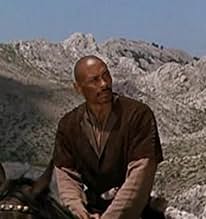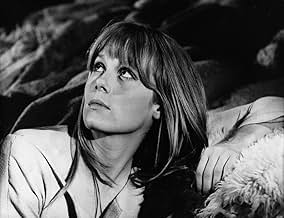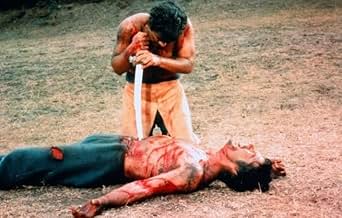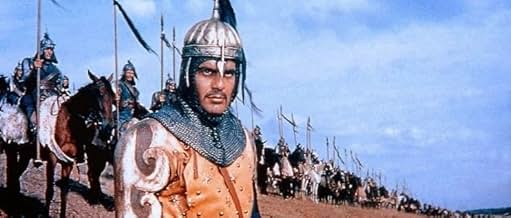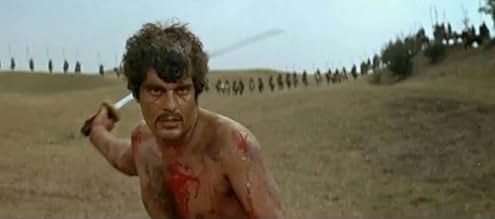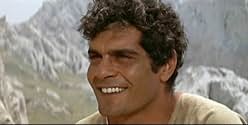IMDb रेटिंग
5.8/10
2.7 हज़ार
आपकी रेटिंग
अपनी भाषा में प्लॉट जोड़ेंDuring the thirteenth century, the shy Mongol boy Temujin becomes the fearless leader Genghis Khan, who unites all Mongol tribes and conquers most of Asia, Europe, and the Middle East.During the thirteenth century, the shy Mongol boy Temujin becomes the fearless leader Genghis Khan, who unites all Mongol tribes and conquers most of Asia, Europe, and the Middle East.During the thirteenth century, the shy Mongol boy Temujin becomes the fearless leader Genghis Khan, who unites all Mongol tribes and conquers most of Asia, Europe, and the Middle East.
- निर्देशक
- लेखक
- स्टार
Françoise Dorléac
- Bortei
- (as Francoise Dorleac)
Susanne Hsiao
- Chin Yu
- (as Suzanne Hsaio)
फ़ीचर्ड समीक्षाएं
I remembered enjoying this film when I saw it as a pre-teen on television in the '60's. I have remained an avid fan of adventure films and epics. So, when it was aired yesterday on TCM, I tuned in with anticipation. It had not aged well. Perhaps all of the anomalies are more difficult for a mature movie fan to accept.
The best parts of this film are the locations, the sets, the costumes and the props. Even so, the sets are never quite convincingly grand enough. They retain the flavor of sets. The photography never captures the locations in a way that conveys the vastness of Central Asia. And the impact of the costumes and props is diminished by the fact that they are at the service of a predominantly Caucasian cast attempting to portray the tribes of Mongolia.
Blonde Francoise Dorleac, who portrays Genghis Khan's wife is the most glaring racial anomaly. But the entire cast is similarly anomalous. At least Stephen Boyd and Omar Shariff aren't blond. But Englishmen, James Mason and Robert Morley look hopelessly out of place. (I personally wondered how people of Oriental heritage reacted to Mason's stereotypical pronunciation of the letter "L" as an "R!") I don't really find a lot of fault with the portrayals offered by Mason and Morley, although I do agree with the suggestion of several reviewers that they seem like they wandered in from a production of the Mikado.
Lastly, I cringed at the soundtrack - typically Occidental-sounding pseudo-epic orchestrations with grandiose flourishes. The heroic-sounding 4/4 marches were typical of the Sword and Sandal epics of the day. Only a stray chord here and there suggested an Oriental setting.
In that era, it was inconceivable to cast Orientals in the principal roles of a film of this one's pretensions. Under the circumstances Hollywood would have done better to simply avoid attempts to depict tales of Asian peoples.
In the end, bizarre casting and completely Occidental-sounding music render this film difficult to swallow for a film-goer looking for anything beyond a shallow adventure story. With the number of Oriental actors in Hollywood films today, a GOOD portrayal of the life of Genghis Khan is ripe for filming!
The best parts of this film are the locations, the sets, the costumes and the props. Even so, the sets are never quite convincingly grand enough. They retain the flavor of sets. The photography never captures the locations in a way that conveys the vastness of Central Asia. And the impact of the costumes and props is diminished by the fact that they are at the service of a predominantly Caucasian cast attempting to portray the tribes of Mongolia.
Blonde Francoise Dorleac, who portrays Genghis Khan's wife is the most glaring racial anomaly. But the entire cast is similarly anomalous. At least Stephen Boyd and Omar Shariff aren't blond. But Englishmen, James Mason and Robert Morley look hopelessly out of place. (I personally wondered how people of Oriental heritage reacted to Mason's stereotypical pronunciation of the letter "L" as an "R!") I don't really find a lot of fault with the portrayals offered by Mason and Morley, although I do agree with the suggestion of several reviewers that they seem like they wandered in from a production of the Mikado.
Lastly, I cringed at the soundtrack - typically Occidental-sounding pseudo-epic orchestrations with grandiose flourishes. The heroic-sounding 4/4 marches were typical of the Sword and Sandal epics of the day. Only a stray chord here and there suggested an Oriental setting.
In that era, it was inconceivable to cast Orientals in the principal roles of a film of this one's pretensions. Under the circumstances Hollywood would have done better to simply avoid attempts to depict tales of Asian peoples.
In the end, bizarre casting and completely Occidental-sounding music render this film difficult to swallow for a film-goer looking for anything beyond a shallow adventure story. With the number of Oriental actors in Hollywood films today, a GOOD portrayal of the life of Genghis Khan is ripe for filming!
Not quite as bad as John Wayne's famed turkey THE CONQUEROR, but getting there. Problem was with this flick, the makers dumped historical accuracy in favor of developing a Ben-Hur-Messala type confrontation between Genghis Khan (Sharif, at the height of his popularity) and his nemesis, a scowling bewhiskered Jamuga (none other than "Messala" himself - Stephen Boyd)
Plenty of Mongol action and cruelty and the concluding battle between Sharif and Boyd is pretty in-your-face stuff. Production values were OK and suitably epic-ish in feel. The wheels start to fall off though with Robert Morley as the Chinese Emperor, some throwback to his role in 55 DAYS IN PEKING and worse, mega-british James Mason as Kam Ling, as likely a chinese adviser to Morley as Adam Sandler playing Abraham Lincoln. In a minor role as Subatai, Kenneth Cope is struggling to hold down any credibility whatsoever, having been first-string comic relief to David Frost on the THAT WAS THE WEEK THAT WAS TV show.
Not for the epic Hall of Fame I'm afraid!
Plenty of Mongol action and cruelty and the concluding battle between Sharif and Boyd is pretty in-your-face stuff. Production values were OK and suitably epic-ish in feel. The wheels start to fall off though with Robert Morley as the Chinese Emperor, some throwback to his role in 55 DAYS IN PEKING and worse, mega-british James Mason as Kam Ling, as likely a chinese adviser to Morley as Adam Sandler playing Abraham Lincoln. In a minor role as Subatai, Kenneth Cope is struggling to hold down any credibility whatsoever, having been first-string comic relief to David Frost on the THAT WAS THE WEEK THAT WAS TV show.
Not for the epic Hall of Fame I'm afraid!
As an user has pointed out ,this is the last of the spectaculars of the late fifties/early sixties which began with De Mille's "Ten Commandments" and included such works as "Ben Hur" ,"Spartacus " (which was more Kirk Douglas' work than Kubrik's ),the highly underrated "Cleopatra"(when will we see the uncut version?),Mann 's "El Cid" and "Fall of the Roman Empire" .
This is the last hurrah,but it's a bad film.James Mason and Robert Morley do not seem to take their roles seriously (as Chinese characters!!)and their playing is deliciously tongue-in-cheek.But all the others seem to believe in this far-fetched tale ,very dubious historically ,with Egyptian Omar Sharif as the lead who abducts pretty princess (French Françoise Dorléac) who is raped by Irish Villain (even
nastier than Ben Hur's Messala) Boyd.There's also American Wallach who offers him his two daughters.Both Sharif and Boyd seem to enjoy bondage (collar ,cage,etc).When he speaks to common women ,Genghis is feminist (it's up to them to choose) ,but when he is with his wife ,he's a more credible macho.
Incidentally,Sharif,Mason and Dorléac's sister (Catherine Deneuve) would team up three years later in Terence Young's "Mayerling".This time,Mason was Sharif's father .
If you want to see a good Sharif movie,do choose "Dr Zhivago" instead.
This is the last hurrah,but it's a bad film.James Mason and Robert Morley do not seem to take their roles seriously (as Chinese characters!!)and their playing is deliciously tongue-in-cheek.But all the others seem to believe in this far-fetched tale ,very dubious historically ,with Egyptian Omar Sharif as the lead who abducts pretty princess (French Françoise Dorléac) who is raped by Irish Villain (even
nastier than Ben Hur's Messala) Boyd.There's also American Wallach who offers him his two daughters.Both Sharif and Boyd seem to enjoy bondage (collar ,cage,etc).When he speaks to common women ,Genghis is feminist (it's up to them to choose) ,but when he is with his wife ,he's a more credible macho.
Incidentally,Sharif,Mason and Dorléac's sister (Catherine Deneuve) would team up three years later in Terence Young's "Mayerling".This time,Mason was Sharif's father .
If you want to see a good Sharif movie,do choose "Dr Zhivago" instead.
This has about as much to do with the real Genghis Khan as the Hughes film"The Conquerer".If you want to know about the real historical figure,read Lamb's 1920s book.That aside,we have to appreciate the production values of the film.Sets,props,etc.,are all ok.None of these people,however,can scarcely be imagined as Central Asians.Greek Savalas and Alabaman Strode come closest.Wallach,as the Shah,makes an acceptable sly villain,and not an unbelievable Levantine.Everybody else is not only much too European,but much too Nordic,as well.(Sharif is only a minor exception to this generalisation.)And Morley,Mason,and Hordern all act as though they wandered in from a road company of "The Mikado".Watch this film for amusement,and perhaps free-wheeling historical fiction(aka Robert E. Howard),but don't take it too seriously.
This is a biopic of Temujin (Carlo Cura/Omar Sharif). This starts with the massacre of his tribe and being taken captive. He would escape and slowly rebuild his tribe. His shaman explains that there are three circles. Their middle circle is full of poor fighting tribes while the Chinese and the white Westerners are rich in the two outer circles. He would conquer the whole Mongolian steppe and meet the Chinese emperor.
This is an old Hollywood epic. It follows the tradition of western actors playing Asian characters. I don't expect any better but it is still very old fashion and dated. The story is fictional, but to be fair, the actual history is mostly written legends and oral traditions. The story does lose steam over time. There is no criticizing the caliber of the cast despite their incorrect race. It's all very grand and very old.
This is an old Hollywood epic. It follows the tradition of western actors playing Asian characters. I don't expect any better but it is still very old fashion and dated. The story is fictional, but to be fair, the actual history is mostly written legends and oral traditions. The story does lose steam over time. There is no criticizing the caliber of the cast despite their incorrect race. It's all very grand and very old.
क्या आपको पता है
- ट्रिवियाSet in Asia, the movie was shot in Yugoslavia.
- गूफ़Chinese men wear their hair in a pigtails. At the time, men wore long hair in a topknot. They didn't wear pigtails until the Qing/Manchu dynasty (1644-1912).
- भाव
Emperor of China: It is better to light one candle than to curse the darkness.
- इसके अलावा अन्य वर्जनAll UK releases are cut by one min three secs. The cinema version was cut for nudity and later video releases also included additional edits for horse-falls and to a rape scene. In the latest UK DVD release, the only cuts are for dangerous horse falls (35 seconds).
- कनेक्शनFeatured in Cinema Komunisto (2010)
टॉप पसंद
रेटिंग देने के लिए साइन-इन करें और वैयक्तिकृत सुझावों के लिए वॉचलिस्ट करें
- How long is Genghis Khan?Alexa द्वारा संचालित
विवरण
- रिलीज़ की तारीख़
- कंट्री ऑफ़ ओरिजिन
- भाषा
- इस रूप में भी जाना जाता है
- Dschingis Khan
- फ़िल्माने की जगहें
- Yugoslavia(Press book)
- उत्पादन कंपनियां
- IMDbPro पर और कंपनी क्रेडिट देखें
बॉक्स ऑफ़िस
- बजट
- $35,00,000(अनुमानित)
- चलने की अवधि2 घंटे
- पक्ष अनुपात
- 2.35 : 1
इस पेज में योगदान दें
किसी बदलाव का सुझाव दें या अनुपलब्ध कॉन्टेंट जोड़ें




